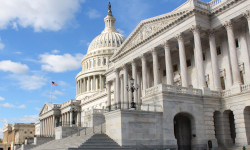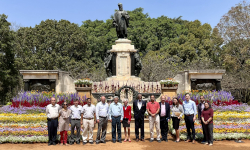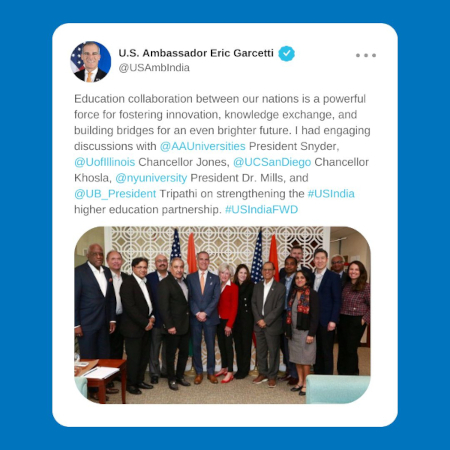 AAU Opposes House Bill That Would Require Certain Nonprofit Institutions to Repay Unpaid Federal Student Loan Balances
AAU Opposes House Bill That Would Require Certain Nonprofit Institutions to Repay Unpaid Federal Student Loan Balances
The House is expected to vote on a bill this week that, in its present form, would require some schools to reimburse the federal government for federal financial aid provided to their students.
This provision of the revised Bipartisan Workforce Pell Act (H.R. 6585) would apply to private nonprofit colleges and universities that are subject to the endowment tax. Institutions would be required to pay the principal and interest on unpaid loans as well as any loans that were forgiven by the federal government for students who attended those schools and then either defaulted on their federal loans or gained loan forgiveness through programs like Public Service Loan Forgiveness.
The fees are designed to help pay for a new program that would expand federal Pell Grants – which already can be used for tuition in traditional degree programs as well as longer-term non-degree workforce education – to cover short-term workforce development training courses. While AAU supports this expansion of Pell, it is opposed to the proposed cost offset, which sets a historic and dangerous precedent by singling out a specific set of institutions to pay for another congressional priority. As the National Association of Independent Colleges and Universities points out: “Ironically, the colleges and universities being penalized are the very institutions with the highest completion rates, the lowest [loan] default rates, and the lowest costs of low-income students.”
While penalizing schools with large charitable endowments, the bill does not grant those institutions the ability to limit their students’ loan borrowing and shifts the accountability to pay back the loans from student borrowers to educational providers. AAU encourages lawmakers to vote “no” on the bill unless Congress finds another way to offset the costs of short-term Pell Grants.
 AAU Presidents, Staff Travel to India to Strengthen Partnerships Between U.S. and Indian Universities
AAU Presidents, Staff Travel to India to Strengthen Partnerships Between U.S. and Indian Universities
AAU President Barbara R. Snyder traveled to India last week with AAU staff and a delegation of presidents and chancellors from AAU institutions to strengthen scientific cooperation and research collaboration between universities in the United States and India. The delegation continued a dialogue AAU began last year with higher education leaders in India about how to implement the recommendations outlined in the final report of the AAU Task Force on Expanding U.S.-India University Partnerships.
The delegation included AAU Board Chair and University of Illinois Urbana-Champaign Chancellor Robert Jones; University of California, San Diego Chancellor Pradeep Khosla; Tufts University President Sunil Kumar; New York University President Linda Mills; University at Buffalo President Satish Tripathi; AAU Senior Vice President for Government Relations and Public Policy Toby Smith; and AAU Associate Vice President for Government Relations and Public Policy Hanan Saab.
The delegation met with Indian Department of Science and Technology Secretary Abhay Karandikar, Principal Scientific Adviser to the Government of India Ajay K. Sood, and representatives from India’s Ministry of Education to talk about how to begin operationalizing the Indo-U.S. Global Challenges Institute. The delegation also met with leaders of the Indian Institutes of Technology and the Indian Institute of Science; U.S. Ambassador to India Eric Garcetti; Consul General for the U.S. Consulate in Mumbai Mike Hankey; and leaders from other universities in India as well as industry leaders. AAU thanks our Indian partners for their hospitality and looks forward to continuing to work with them to facilitate new joint research and educational ventures.
 AAU Institutions Top Global List of Universities Granted Patents in 2023
AAU Institutions Top Global List of Universities Granted Patents in 2023
The University of California system is once again at the top of a global list of universities granted U.S. utility patents – and the vast majority of the top 10 are, like most of the UC campuses, universities affiliated with AAU.
The University of California system topped the National Academy of Inventors’ list of “Top 100 Worldwide Universities Granted U.S. Utility Patents” with 546 patents; eight of the 10 campuses in the UC system are AAU members. The UC system has topped the list every year since 2013.
The list highlights the crucial role universities play in developing breakthrough technologies through research. As the UC system highlighted in a press release, however, the number of patents issued only tells part of the story about university innovation. For example, in 2022 alone, UC system researchers logged more than 1,500 inventions and UC’s technology commercialization program helped bring many of those inventions to market. According to the press release, in 2022, “companies licensed 238 inventions from UC and entrepreneurs created 88 startups based on UC inventions.”
Utility patents, according to Forbes, are “issued for the invention of a new and useful process, machine, manufacture, or composition of matter, or a new and useful improvement in those inventions.”
Other AAU-affiliated institutions in the top 10 include the Massachusetts Institute of Technology, the University of Texas system, Stanford University, Purdue University, Harvard University, Arizona State University, and the California Institute of Technology. The NAI rankings are based on data provided by the U.S. Patent and Trademark Office.
 AAU Congressional Statement Highlights How America’s Leading Research Universities Are Protecting the U.S. Science and Technology Enterprise
AAU Congressional Statement Highlights How America’s Leading Research Universities Are Protecting the U.S. Science and Technology Enterprise
Earlier this month, AAU submitted a statement for the record on the House Committee on Science, Space, and Technology’s hearing on Examining Federal Science Agency Actions to Secure the U.S. Science and Technology Enterprise. AAU’s statement emphasized that “universities are working every day to secure and protect the integrity of the research they conduct on behalf of the federal government.” Committee Chairman Frank Lucas (R-OK) also entered into the hearing record a letter AAU President Barbara R. Snyder sent to the White House Office of Science and Technology Policy on research security standards.
The committee convened the hearing to “examine the actions taken by federal science agencies to implement recent guidance and laws to protect proprietary technology and scientific discoveries.” In his opening statement, Chairman Lucas emphasized that “research theft is one of the single greatest threats to our competitiveness as a nation.”
AAU’s statement outlined the many ways universities are actively working to prevent research theft and to secure the U.S. science and technology research enterprise. The statement noted, for example, that universities are building faculty awareness; developing comprehensive risk assessment and review processes; implementing research security training requirements; complying with existing federal policies and congressional requirements; and engaging with federal intelligence agencies and security officials. “As the threats to the research environment continue to evolve, we look forward to continuing to engage with the committee on issues related to research security and share how America’s leading research universities are approaching these issues,” it concluded.
News of Interest
KAGS: Texas A&M Selected by NASA for First-Ever Exploration Park Facility – NASA recently selected the Texas A&M University system to develop a new facility focused on “human spaceflight research and development” at the Johnson Space Center in Houston. Texas A&M University President Mark Welsh said that the agreement would enable the university “to leverage faculty expertise, establish strategic partnerships, and develop resources to foster new discoveries, technological innovations, and a future workforce that will benefit Texas and the nation.”
The Washington Post: Yale University Apologizes for Its Role in Slavery – Earlier this month, Yale University President Peter Salovey formally apologized for the institution’s participation (as well as that of its early leaders) in slavery. President Salovey said that the findings of the Yale and Slavery Research Project, which has been studying the university’s connection to slavery, have “propelled [the university] toward meaningful action to address the continued effects of slavery in society today.”
The Atlantic: Elite Universities Have Not Sacrificed Excellence for Diversity – In an opinion essay, Princeton University President Christopher Eisgruber contested the assumption that “elite universities have pursued diversity at the expense of scholarly excellence.” Instead, he argued: “Efforts to grow and embrace diversity at America’s great research universities have made them better than ever.”
USA Today: Biden Cancels $1.2B in Student Loan Debt for Borrowers on Income-Driven Repayment Plan – The Department of Education announced that the Biden administration is cancelling student debt for more than 150,000 individuals enrolled in the Saving on a Valuable Education (SAVE) income-based repayment plan who have been “in repayment for at least 10 years on a federal student loan of $12,000 or less.” The action “brings the total amount of debt cancellation Biden has approved to $138 billion for nearly 4 million Americans.”
USA Today: A Degree in Artificial Intelligence: Penn Becomes First Ivy to Offer AI Major for Undergrads – Starting this fall, students at the University of Pennsylvania will be able to earn a bachelor’s degree in engineering in artificial intelligence. Students will learn “the principles of AI and how to utilize its abilities in ‘a responsible and ethical way.’” Penn Interim President J. Larry Jameson said the program “represents a leap forward for the Penn engineers who will lead in developing and deploying these powerful technologies in service to humanity.”
Featured Research

Students Are Missing More School, and School Nurses May BeWell-Positioned to Help
New research from the University of Missouri shows that school nurses could be key in identifying students at risk of becoming chronically absent, especially students with many partial-day absences. Such students, the research shows, “often proactively seek out school nurses as a source of comfort and support – presenting an opportunity for school nurses to intervene and provide support before the absenteeism becomes chronic.”

IU Researchers Awarded Defense Funds to Install Coldest Extreme Environmental Chamber in Nation
Researchers at Indiana University have been awarded almost $1 million by the Department of Defense to install an environmental chamber that can reach temperatures of -40 degrees Celsius. The chamber will allow researchers to study how cold “affects the physiology of humans as well as how various equipment and materials work in those temperatures.”
From Our Feeds

Last week, AAU President Barbara R. Snyder and a delegation of presidents and chancellors from AAU institutions met with U.S. Ambassador to India Eric Garcetti at the U.S. Embassy in New Delhi to talk about research collaboration and scientific diplomacy between the United States and India. “Education collaboration between our nations is a powerful force for fostering innovation, knowledge exchange, and building bridges for an even brighter future,” said Ambassador Garcetti on X after the meeting.